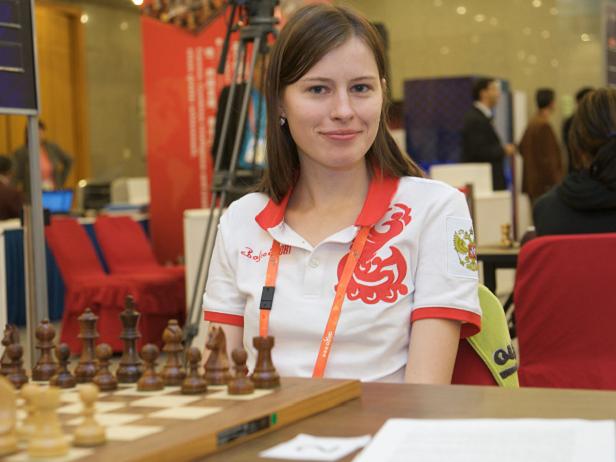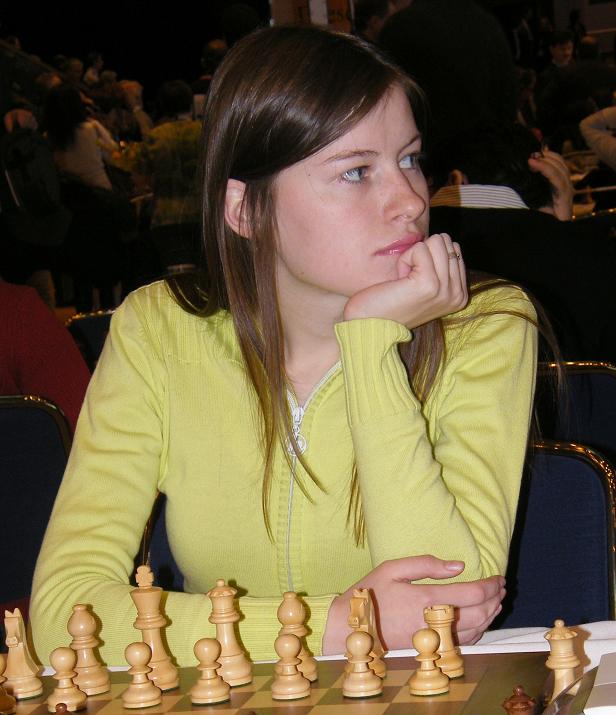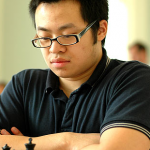Chess Corner – It’s a (chess) man’s world: Natalia Pogonina interviewed
Chess Corner, New in Ceasefire - Posted on Thursday, October 21, 2010 20:27 - 2 Comments

By Paul Lam
Natalia Pogonina is a WGM (Woman Grandmaster) and one of the best female chess players in the world. She is a three-times European Champion and winner of numerous international tournaments. Most recently, she represented the Russian Olympic chess team in the Women’s Chess Olympiad. Her peak rating has been over 2500, a mark associated with the title of a male Grandmaster.
Her openness, beauty, intelligence and, naturally, her chess-playing abilities, have helped make Natalia a well-known and popular personality in the chess world. Natalia is currently studying for an MA in law at the Saratov State Academy of Law. In her spare time, she enjoys flamenco, singing, music, photography, sports, travelling, literature and poetry.
During the recent Chess Olympiad, Natalia kindly agreed to an interview for Chess Corner, which we reproduce below.
Natalia Pogonina: An Interview
How did you start playing chess and what attracts you to the game?
My Grandpa introduced me to chess when I was 5. Later on I won the school’s checkers tournament, and one of our local coaches asked me if I wanted to try out chess. The rest is history.
Chess is a very interesting game by itself. Also, one gets to travel a lot, communicate with great people, and also feel free from the work office routine.
At school were you stronger in mathematics and sciences than in humanities and the arts? Maths was never a strong subject for me, contrary to people’s expectations of me as a chess player. Does this show that chess is a multi-faceted game, and not a purely rational, calculating exercise as commonly thought?
The connection between Maths and chess abilities is overrated. I myself and many of my friends are more into humanities than science, but it doesn’t prevent us from playing decent chess.
Can any person of reasonable intelligence become a master through pure dedication to chess, studying, coaching, playing etc, or is something else also required?
This is a tough question since it’s very hard to define “reasonable intelligence”, “master”, etc. I am an optimist who believes in the powers of the human mind. However, most people tend to either overestimate the difficulty of chess (“one can’t make it to FM on his/her own”) or underestimate (“I have purchased a tactics book, will I be a GM in a year?”).
The truth is somewhere in the middle. Not sure that anyone can become a GM, and I am absolutely positive that not everyone should try to become one. As long as a person loves chess, why not play it and see how it goes? Most people asking the “how to become a GM” questions don’t really love chess, they are just egocentric guys who want to prove their superiority by getting that diploma and badge. They rarely succeed, by the way.
As a young chess player, did you receive systematic training from coaches? Is this one of the reasons for Russia being a chess ‘super-power’? Were there other important factors for you in improving your game?
Yes, it’s important to have access to good coaching and strong tournaments. Most people can’t improve fast enough since they can’t afford to travel a lot. I am from a family of rather modest income, but the fact that we lived in Russia was helpful in terms of being able to play in strong national tournaments and occasionally travel abroad (for the European and World Championships, etc.). On the contrary, people from countries where chess is not that popular often have difficulties finding the right events to play in.
To what extent does style on the board reflect personality?
A lot. If one has psychological problems, weaknesses, they will become visible on the board. That’s why people love chess: it’s a clash of personalities (wits, character, strength, etc.).
Are there any chess-players in particular who you look up to and admire, and why?
I don’t look up to anyone or have idols. There are people in chess who I respect a lot, but everyone should have his/her own way. You may want to pinpoint the best traits of certain players and try to replicate that, but not completely imitate someone.
Your new book, the provocatively titled ‘Chess Kama Sutra’, has raised some eyebrows! Please tell us about the book and what inspired you to write it. What exactly is the relationship between chess and sex?
Yes, the book has gotten a lot of media coverage even before its release. It all started with an innocent joke about “studying new positions together”, but then, as we started studying the Kama Sutra, Buddhism, Indian culture in general, we have noticed many similarities between chess and sex: origin, terms, positions, ways of dealing with your partner/s and so on. It’s hard to address this question in a paragraph, but there are much more connections between chess and sex than most people can imagine.
Is chess an absurd pleasure? Some people comment that it requires you to invest a huge amount of time for little tangible reward. How would you respond to critics who feel that chess is simply a sad waste of brains?
Well, I wouldn’t be trying to refute their statement. This judgment is based on the values of a person. If someone prefers science or business to chess, it’s his/her way. On the other hand, chess is exciting and challenging for anyone. That’s why I don’t consider it inferior to any other intellectual activities.
What are your thoughts on having separate master titles for women in chess? Some would argue that it is a sign of lower expectations for female players.
That’s an evergreen argument. As long as women are not strong enough to compete with men, it makes sense to support them by maintaining the special prizes & titles. Nonetheless, in the long run this positive discrimination should be abolished, as well as the negative discrimination that keeps women from reaching their chess peak.
There is a perception that women are not suited to chess by virtue of their sex. This is a view that has been expressed by some of the great players, notably Fischer, and even today by some leading grandmasters e.g. Levon Aronian. Do you think that players like yourself are simply exceptions to the norm?
No, I think it rather has to do with the environment and other social factors. See my article “Women and men in chess – smashing the stereotypes”.
You are married to Peter Zhdanov, also a chess-player. A lot of top chess players are also in, or have been in, relationships with fellow players e.g. Shirov and Cmilyte, Fressinet and Skripchenko. Is chess such an obsession for players that it is only natural they will be more likely to find love amongst fellow players?
Of course, it’s much easier when your husband/wife respects the game, is interested in your occupation and can support you. On the other hand, there is a popular phrase “at least one person in the family should be sane”. Many chess players are not that easy to get along with, that’s why we often see chess couples break up.
 Chess computers/programs have transformed the game in the last two decades. What are the pros and cons of this? Have they dehumanised the game?
Chess computers/programs have transformed the game in the last two decades. What are the pros and cons of this? Have they dehumanised the game?
The pros are that it’s much easier to gain access to information (computer databases vs numerous books) and study new lines (no more blunders in home preparation), as well as train in general. The cons are that one has to memorize a lot, much more than before. Top professional chess nowadays is more about having the better analytical team, computer power and excellent memory than ever. Many people don’t like it, they want to PLAY chess, not study it for hours at home on a daily basis.
How difficult have you found balancing your academic studies, other off-the-board activities and, more recently, motherhood with chess?
To become a strong player you have to overcome a lot of difficulties and recover from failures. A strong character, and determination to go on, helps in life. Of course, it’s hard to balance all my activities, but it’s quite interesting and challenging to try to follow such a demanding and crazy schedule as mine.
What are your goals and ambitions, chess-related and in general?
Help make chess a popular and internationally respected game, improve the well-being of professional players. Keep becoming a better player myself day after day. Ongoing improvement is more important for me than ambitious goals. Of course, I wouldn’t refuse to become a world champion, but I am not obsessed with it like some people are. There are many things in life that are more important than titles, money and fame. So, generally speaking, improving and searching for harmony and helping others do it is what matters a lot to me.
Was Kasparov’s retirement a loss for chess and at best a draw for Russian politics? What do you make of his political activism since his retirement? Has he been misguided in the path he has chosen, and was early retirement a mistake?
It’s his personal decision; I am not the one to judge him. Of course, most people would have been happy to see Kasparov play on. Frankly speaking, he has no political weight in Russia, just a very minor group of supporters. It can’t be compared to his chess career, where he is arguably the greatest player ever.
Nonetheless, only Garry himself has the right to choose his path, even if it is considered to be wrong by everyone else.
The world of chess politics is just as messy! Do you have any thoughts on the FIDE elections and its implications?
I am trying to avoid getting involved deeply in this process. Bitter rivals who accuse each other of mortal sins suddenly get together, hug each other and drink vodka. This looks like a strange performance…Not worth wasting one’s emotions and energy on. Anyway, let’s hope that the candidates will do their best to promote chess in the world and make FIDE a better organization.
Stereotypes regarding chess still persist. In your opinion, what can be done to improve the image of chess?
Generally speaking, chess has a positive image: noble, intelligent, elite. Of course, there are also associations with nerdiness, bad looks and so on. What can be done about it? Act normal, communicate with people (both in person and via media) and launch websites. Promote chess by agreeing to photo shoots (many players are actually quite good-looking). Give simuls to kids, chess fans, influential businessmen and politicians, etc.
Thank you very much once again for agreeing to this interview Natalia. To finish off, do you have any message you would like to pass on to the readers?
You are welcome! Love chess, trust in yourself, do your best to make our favourite game more popular!
Wishing you the best of luck for the future Natalia, on and off the board!
Solution to previous puzzle: If 28.Bxe4? then …Qg3+ delivers a killer blow. 29.Bg2 is met by …Rd1 forcing mate, while 29.Kh1 is followed by …Rd2 and again the position is terminal for White. Well done to Gus for correctly identifying the solution!

Paul Lam, a law graduate, is an internationally rated chess-player. He was one of England’s leading junior players, representing the national team in Estonia and the Czech Republic. His column on chess will be appearing every other Thursday
2 Comments
Musab
Chess Corner – It's a (chess) man's world: Natalia Pogonina … | Chess IQ
[…] this link: Chess Corner – It's a (chess) man's world: Natalia Pogonina … Filed Under: General Tagged With: arthouse, producing-high-quality, quarterly-cultural, […]


Great interview! thanks